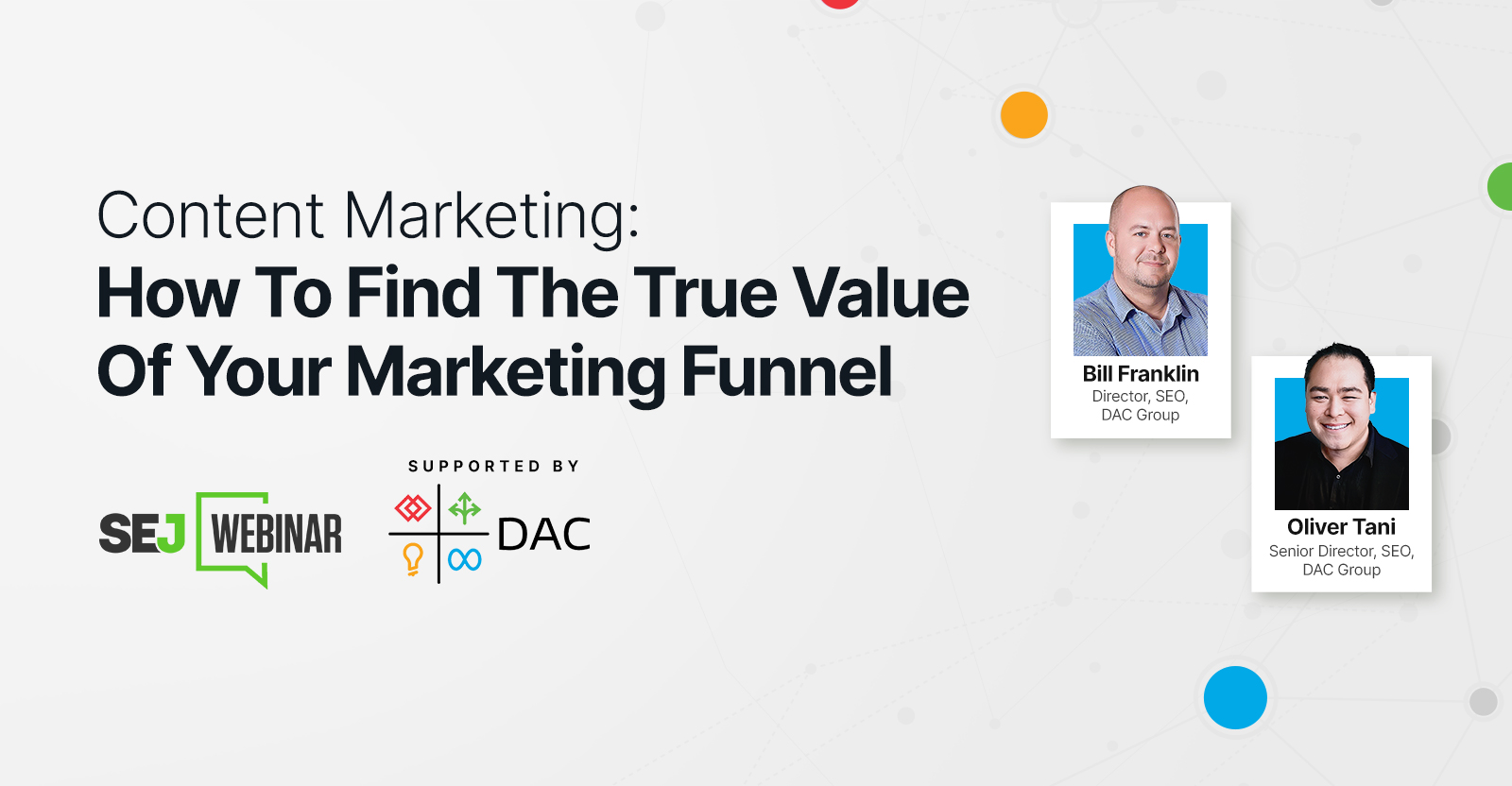SEO
Are Digital Marketing Courses Worthwhile? Pro Marketers Respond

Digital marketing courses are everywhere. Everyone offers them.
You can take digital marketing courses from colleges, third-party organizations, and the platforms themselves.
But are digital marketing courses worth it?
I’ve been in the digital marketing space for 20 years and have worked in marketing even longer.
Digital marketing classes weren’t around when I was in college – because digital marketing itself wasn’t around.
So I asked my peers what they thought about digital marketing courses and whether they’re worth the time.
Digital Marketing Courses Have Their Challenges
Some marketers felt that the courses were too basic and not practical.
@beyondthepaid I have digital marketing course in my master’s curriculum but it was too basic & far from practicality and also It depend up on what kind of course we take either in college degree/ course.
— Karthik (@Karthikbv33) March 1, 2022
College courses I had were outdated and not very applicable on the current marketing and ecommece state, I guess it’s because marketing and ecommerce are changing fast on operational level. In terms Of strategy college was quite good.
— BenjaminWenner (@BN_Wenner) March 1, 2022
Both posters make good points.
College courses in general, not just marketing courses, can be too theoretical, making them impractical.
It’s hard to apply theoretical concepts in real life.
And digital marketing changes so fast that, to Wenner’s point, course content becomes outdated very quickly.
In an internal discussion at work, we discussed how creating detailed process documents for paid search is kind of a waste of time. Things change so fast that we’d spend inordinate amounts of time updating them.
To help keep course content fresh, some savvy digital marketing instructors bring real-world practitioners as guest speakers or lecturers to their courses to keep course content fresh.
I’ve spoken to a few classes at Michigan State University about what it takes to succeed in paid search and paid social.
Learning from real-world speakers is effective because they’re up to speed on the latest in digital marketing.
Basic Marketing Strategy Is Still Important
Marketing strategy, however, doesn’t change as fast as technical knowledge does. Many concepts don’t change at all.
There are marketing concepts I learned in my undergrad courses that I still use today, 30-something years later.
Many advertising professionals reference David Ogilvy, who is widely considered, the “Father of Advertising.”
Ogilvy was born in 1911. The height of his career came during the Mad Men era of the 1950s and 1960s – more than 50 years ago.
Yet his adages about advertising strategy are still applicable today.
This quote is just as applicable to paid search today as it was to print advertising in Ogilvy’s day:
“On the average, five times as many people read the headline as read the body copy. When you have written your headline, you have spent eighty cents out of your dollar.”
A “how-to” course on setting up a Google Ads campaign or bid management may not be worthwhile, but a course in marketing strategy certainly is.
Many Kicked Off Careers With Digital Marketing Courses
Even though digital marketing seems to change daily, most professionals say that digital marketing courses are worthwhile.
Some credited digital marketing courses as the reason they work in the field today.
My intro to marketing class, which was a requirement for my original degree of International Business, literally is the reason I am in the space. Would not be in marketing without @MGSchoon. I don’t use most of what I learned past that in everyday marketing… 1/2
— Alex Smolen (@alxsmolen) March 1, 2022
My intro into digital marketing was through a college course. One of my favorite classes I took.
It was worth it to me as it introduced a lot of the concepts/ideas I still use & helped me choose PPC as my focus area.
— Shaun Elley (@selley2134) February 28, 2022
Same here! Junior year. Prof entered the class in a Google-backed international Google AdWords competition and the rest is history
— Jeremy Krantz (@JeremyKrantz) February 28, 2022
Good teachers also make a difference, as Elley and Krantz indicate above.
Go Beyond Digital Marketing Coursework
Becoming a successful digital marketer is about more than just taking marketing courses.
Several experts cited a well-rounded education as the basis for a successful digital marketer.
Michael Stebbins, who co-founded OMCP to bring standards to digital marketing and courses, says:
“There are courses out there that can fill in as much as 70% of the hard skills a marketer needs to practice on the job.
Lately, a majority of digital marketing practices can be evergreen; for example, landing page agreements with ad offers, analytics reporting tied to business objectives, or even keyword research methodologies.
The best blend for someone entering the industry combines three things: Completing an accredited course covering generally-accepted practices, some platform course completion, and real-life experience.”
Brad Geddes, who has taught digital marketing courses since 2011, agrees:
“Overall, people seem best suited to PPC if they do a mixture of digital marketing with a minor in psychology (or a double major as there’s a lot of math when you get into Psych BS majors).
My background was personality psychology (0 marketing courses), and it serves me well in running PPC campaigns.”
So Will Digital Marketing Courses Help Me Find A Job?
The answer goes beyond yes or no.
We’ve established that digital marketing courses can quickly become outdated, especially those focusing on technical training.
A course taken 5-10 years ago is likely obsolete.
That said, candidates, especially those new to the digital marketing field, can fill in some hard skills with reputable courses.
But soft skills, such as communication, teamwork, and problem solving, are harder to teach.
And soft skills are crucial for success in digital marketing.
In fact, the OMCP® 2019 Role Delineation Study found that strategy and communication of practice were the top priorities for most digital marketing disciplines across all job responsibilities.
Think about that for a second.
Strategy and communication of practice were more important to employers than technical skills such as keyword research, bid management, developing audiences, and developing content.
Consequently, a marketing strategy course would most definitely be worthwhile.
And work on developing your soft skills.
What Should I Look For When Hiring Digital Marketing Professionals?
If you’re hiring digital marketing professionals, most experts agree to look for hard skills, including digital marketing certifications, and soft skills, such as communication and critical thinking.
According to Matt Bailey of SiteLogic:
“When I had my agency, I looked for people who were excellent communicators in writing and speaking, as most of the job is working with clients and constantly presenting, reporting, and working with a team. I hired for soft skills and trained the digital skills.”
Bailey looks for individuals who “share a critical and creative thinking core necessary to accomplish their work and solve problems.”
Problem-solving is a huge part of digital marketing, and people without this aptitude often struggle in digital marketing roles.
Stebbins suggests that hiring managers recruit from unlikely majors. “When John Marshall and I were building ClickTracks, our local university did not have a strong marketing program. Yet, we had interest from students to join our web analytics team,” he said.
Stebbins added, “We learned to recruit reliably from the economics department for marketing talent and the genetics department for digital analytics. We also learned that sales reps tended to make great PPC and digital advertising specialists (with some minimal training).”
In my own experience, I’ve found that digital marketing courses and certifications are not a good predictor of success.
I’ve had people who passed several certifications who we ended up letting go and others who came to us without a single course and were stellar performers.
As far as soft skills, in my opinion, the biggest skill digital marketing pros need is curiosity.
As Bailey mentioned above, digital marketing involves a lot of problem-solving.
To effectively solve problems, one must be curious about why the problem exists.
Wondering why a campaign suddenly stops performing, or why a particular keyword isn’t converting, is critical. Looking at performance changes, shrugging, and saying “it is what it is” will not cut it.
Successful digital marketers can think critically and ask “why.”
Conclusion
Digital marketing courses can be helpful.
Completing coursework shows that a person is dedicated and able to complete a task.
Those who have verified skills, experience, and education industry certifications stand out as even more invested in the practice.
But courses and certifications aren’t the end-all, be-all.
Plenty of successful digital marketers have not taken a single course.
As Derek Mollins of Brainlabs said, “There is no substitute for running a live campaign.”
If you’re not currently working in the field, volunteer for an organization that needs digital marketing help.
You’ll learn a lot and can help a worthy cause at the same time.
Combine digital marketing courses with developing your soft skills and experience, and you’ll give yourself the best chance for success in the field.
More resources:
Featured Image: fizkes/Shutterstock
SEO
Measuring Content Impact Across The Customer Journey

Understanding the impact of your content at every touchpoint of the customer journey is essential – but that’s easier said than done. From attracting potential leads to nurturing them into loyal customers, there are many touchpoints to look into.
So how do you identify and take advantage of these opportunities for growth?
Watch this on-demand webinar and learn a comprehensive approach for measuring the value of your content initiatives, so you can optimize resource allocation for maximum impact.
You’ll learn:
- Fresh methods for measuring your content’s impact.
- Fascinating insights using first-touch attribution, and how it differs from the usual last-touch perspective.
- Ways to persuade decision-makers to invest in more content by showcasing its value convincingly.
With Bill Franklin and Oliver Tani of DAC Group, we unravel the nuances of attribution modeling, emphasizing the significance of layering first-touch and last-touch attribution within your measurement strategy.
Check out these insights to help you craft compelling content tailored to each stage, using an approach rooted in first-hand experience to ensure your content resonates.
Whether you’re a seasoned marketer or new to content measurement, this webinar promises valuable insights and actionable tactics to elevate your SEO game and optimize your content initiatives for success.
View the slides below or check out the full webinar for all the details.
SEO
How to Find and Use Competitor Keywords

Competitor keywords are the keywords your rivals rank for in Google’s search results. They may rank organically or pay for Google Ads to rank in the paid results.
Knowing your competitors’ keywords is the easiest form of keyword research. If your competitors rank for or target particular keywords, it might be worth it for you to target them, too.
There is no way to see your competitors’ keywords without a tool like Ahrefs, which has a database of keywords and the sites that rank for them. As far as we know, Ahrefs has the biggest database of these keywords.
How to find all the keywords your competitor ranks for
- Go to Ahrefs’ Site Explorer
- Enter your competitor’s domain
- Go to the Organic keywords report
The report is sorted by traffic to show you the keywords sending your competitor the most visits. For example, Mailchimp gets most of its organic traffic from the keyword “mailchimp.”


Since you’re unlikely to rank for your competitor’s brand, you might want to exclude branded keywords from the report. You can do this by adding a Keyword > Doesn’t contain filter. In this example, we’ll filter out keywords containing “mailchimp” or any potential misspellings:


If you’re a new brand competing with one that’s established, you might also want to look for popular low-difficulty keywords. You can do this by setting the Volume filter to a minimum of 500 and the KD filter to a maximum of 10.


How to find keywords your competitor ranks for, but you don’t
- Go to Competitive Analysis
- Enter your domain in the This target doesn’t rank for section
- Enter your competitor’s domain in the But these competitors do section


Hit “Show keyword opportunities,” and you’ll see all the keywords your competitor ranks for, but you don’t.


You can also add a Volume and KD filter to find popular, low-difficulty keywords in this report.


How to find keywords multiple competitors rank for, but you don’t
- Go to Competitive Analysis
- Enter your domain in the This target doesn’t rank for section
- Enter the domains of multiple competitors in the But these competitors do section


You’ll see all the keywords that at least one of these competitors ranks for, but you don’t.


You can also narrow the list down to keywords that all competitors rank for. Click on the Competitors’ positions filter and choose All 3 competitors:


- Go to Ahrefs’ Site Explorer
- Enter your competitor’s domain
- Go to the Paid keywords report


This report shows you the keywords your competitors are targeting via Google Ads.
Since your competitor is paying for traffic from these keywords, it may indicate that they’re profitable for them—and could be for you, too.
You know what keywords your competitors are ranking for or bidding on. But what do you do with them? There are basically three options.
1. Create pages to target these keywords
You can only rank for keywords if you have content about them. So, the most straightforward thing you can do for competitors’ keywords you want to rank for is to create pages to target them.
However, before you do this, it’s worth clustering your competitor’s keywords by Parent Topic. This will group keywords that mean the same or similar things so you can target them all with one page.
Here’s how to do that:
- Export your competitor’s keywords, either from the Organic Keywords or Content Gap report
- Paste them into Keywords Explorer
- Click the “Clusters by Parent Topic” tab


For example, MailChimp ranks for keywords like “what is digital marketing” and “digital marketing definition.” These and many others get clustered under the Parent Topic of “digital marketing” because people searching for them are all looking for the same thing: a definition of digital marketing. You only need to create one page to potentially rank for all these keywords.


2. Optimize existing content by filling subtopics
You don’t always need to create new content to rank for competitors’ keywords. Sometimes, you can optimize the content you already have to rank for them.
How do you know which keywords you can do this for? Try this:
- Export your competitor’s keywords
- Paste them into Keywords Explorer
- Click the “Clusters by Parent Topic” tab
- Look for Parent Topics you already have content about
For example, if we analyze our competitor, we can see that seven keywords they rank for fall under the Parent Topic of “press release template.”


If we search our site, we see that we already have a page about this topic.


If we click the caret and check the keywords in the cluster, we see keywords like “press release example” and “press release format.”


To rank for the keywords in the cluster, we can probably optimize the page we already have by adding sections about the subtopics of “press release examples” and “press release format.”
3. Target these keywords with Google Ads
Paid keywords are the simplest—look through the report and see if there are any relevant keywords you might want to target, too.
For example, Mailchimp is bidding for the keyword “how to create a newsletter.”


If you’re ConvertKit, you may also want to target this keyword since it’s relevant.
If you decide to target the same keyword via Google Ads, you can hover over the magnifying glass to see the ads your competitor is using.


You can also see the landing page your competitor directs ad traffic to under the URL column.


Learn more
Check out more tutorials on how to do competitor keyword analysis:
SEO
Google Confirms Links Are Not That Important

Google’s Gary Illyes confirmed at a recent search marketing conference that Google needs very few links, adding to the growing body of evidence that publishers need to focus on other factors. Gary tweeted confirmation that he indeed say those words.
Background Of Links For Ranking
Links were discovered in the late 1990’s to be a good signal for search engines to use for validating how authoritative a website is and then Google discovered soon after that anchor text could be used to provide semantic signals about what a webpage was about.
One of the most important research papers was Authoritative Sources in a Hyperlinked Environment by Jon M. Kleinberg, published around 1998 (link to research paper at the end of the article). The main discovery of this research paper is that there is too many web pages and there was no objective way to filter search results for quality in order to rank web pages for a subjective idea of relevance.
The author of the research paper discovered that links could be used as an objective filter for authoritativeness.
Kleinberg wrote:
“To provide effective search methods under these conditions, one needs a way to filter, from among a huge collection of relevant pages, a small set of the most “authoritative” or ‘definitive’ ones.”
This is the most influential research paper on links because it kick-started more research on ways to use links beyond as an authority metric but as a subjective metric for relevance.
Objective is something factual. Subjective is something that’s closer to an opinion. The founders of Google discovered how to use the subjective opinions of the Internet as a relevance metric for what to rank in the search results.
What Larry Page and Sergey Brin discovered and shared in their research paper (The Anatomy of a Large-Scale Hypertextual Web Search Engine – link at end of this article) was that it was possible to harness the power of anchor text to determine the subjective opinion of relevance from actual humans. It was essentially crowdsourcing the opinions of millions of website expressed through the link structure between each webpage.
What Did Gary Illyes Say About Links In 2024?
At a recent search conference in Bulgaria, Google’s Gary Illyes made a comment about how Google doesn’t really need that many links and how Google has made links less important.
Patrick Stox tweeted about what he heard at the search conference:
” ‘We need very few links to rank pages… Over the years we’ve made links less important.’ @methode #serpconf2024″
Google’s Gary Illyes tweeted a confirmation of that statement:
“I shouldn’t have said that… I definitely shouldn’t have said that”
Why Links Matter Less
The initial state of anchor text when Google first used links for ranking purposes was absolutely non-spammy, which is why it was so useful. Hyperlinks were primarily used as a way to send traffic from one website to another website.
But by 2004 or 2005 Google was using statistical analysis to detect manipulated links, then around 2004 “powered-by” links in website footers stopped passing anchor text value, and by 2006 links close to the words “advertising” stopped passing link value, links from directories stopped passing ranking value and by 2012 Google deployed a massive link algorithm called Penguin that destroyed the rankings of likely millions of websites, many of which were using guest posting.
The link signal eventually became so bad that Google decided in 2019 to selectively use nofollow links for ranking purposes. Google’s Gary Illyes confirmed that the change to nofollow was made because of the link signal.
Google Explicitly Confirms That Links Matter Less
In 2023 Google’s Gary Illyes shared at a PubCon Austin that links were not even in the top 3 of ranking factors. Then in March 2024, coinciding with the March 2024 Core Algorithm Update, Google updated their spam policies documentation to downplay the importance of links for ranking purposes.
The documentation previously said:
“Google uses links as an important factor in determining the relevancy of web pages.”
The update to the documentation that mentioned links was updated to remove the word important.
Links are not just listed as just another factor:
“Google uses links as a factor in determining the relevancy of web pages.”
At the beginning of April Google’s John Mueller advised that there are more useful SEO activities to engage on than links.
Mueller explained:
“There are more important things for websites nowadays, and over-focusing on links will often result in you wasting your time doing things that don’t make your website better overall”
Finally, Gary Illyes explicitly said that Google needs very few links to rank webpages and confirmed it.
I shouldn’t have said that… I definitely shouldn’t have said that
— Gary 鯨理/경리 Illyes (so official, trust me) (@methode) April 19, 2024
Why Google Doesn’t Need Links
The reason why Google doesn’t need many links is likely because of the extent of AI and natural language undertanding that Google uses in their algorithms. Google must be highly confident in its algorithm to be able to explicitly say that they don’t need it.
Way back when Google implemented the nofollow into the algorithm there were many link builders who sold comment spam links who continued to lie that comment spam still worked. As someone who started link building at the very beginning of modern SEO (I was the moderator of the link building forum at the #1 SEO forum of that time), I can say with confidence that links have stopped playing much of a role in rankings beginning several years ago, which is why I stopped about five or six years ago.
Read the research papers
Authoritative Sources in a Hyperlinked Environment – Jon M. Kleinberg (PDF)
The Anatomy of a Large-Scale Hypertextual Web Search Engine
Featured Image by Shutterstock/RYO Alexandre
-

 PPC4 days ago
PPC4 days ago19 Best SEO Tools in 2024 (For Every Use Case)
-

 MARKETING7 days ago
MARKETING7 days agoWill Google Buy HubSpot? | Content Marketing Institute
-
SEARCHENGINES7 days ago
Daily Search Forum Recap: April 16, 2024
-

 SEO7 days ago
SEO7 days agoGoogle Clarifies Vacation Rental Structured Data
-

 MARKETING6 days ago
MARKETING6 days agoStreamlining Processes for Increased Efficiency and Results
-
SEARCHENGINES6 days ago
Daily Search Forum Recap: April 17, 2024
-

 SEO6 days ago
SEO6 days agoAn In-Depth Guide And Best Practices For Mobile SEO
-

 PPC6 days ago
PPC6 days ago97 Marvelous May Content Ideas for Blog Posts, Videos, & More








![Elementor Pro Discount (Apr 2024) [70% OFF, Save $150] Elementor Coupon](https://articles.entireweb.com/wp-content/uploads/2024/04/1713729377_Elementor-Pro-Discount-Apr-2024-70-OFF-Save-150-400x240.png)
![Elementor Pro Discount (Apr 2024) [70% OFF, Save $150] Elementor Coupon](https://articles.entireweb.com/wp-content/uploads/2024/04/1713729377_Elementor-Pro-Discount-Apr-2024-70-OFF-Save-150-80x80.png)



You must be logged in to post a comment Login